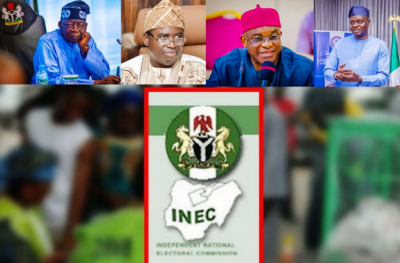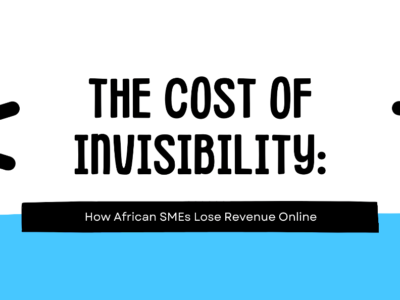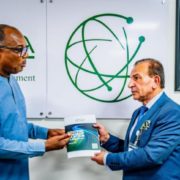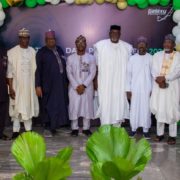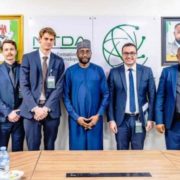Building capacity is the bedrock of rlg
Earlier this year, rlg Communications signed a strategic partnership with Osun state government to develop capacity for the state indigenes in the area of ICT. In this exclusive interview with eT Edge News crew(SEGUN ORUAME, MARTIN EKPEKE and ANSELM MICHERA), the Country Director of rlg Communications, Tosin Ilesanmi opened up on the details of the partnership and how they intend to penetrate the highly competitive Nigerian ICT market with their capacity building formula. The communications company started off in Ghana and will be opening its Gambia’s operations later this year. It’s Nigerian operation will be the third within the ECOWAS space.
You have been on for about ten years now as rlg in Ghana, and now there is rlg Nigeria to flag off business in Osun State. What is the relationship between rlg Nigeria and rlg Ghana; what is your agenda in Osun state?
rlg Nigeria is just a subsidiary of rlg Ghana. As you will know, rlg as a brand is part of the Agams Group. So what we are doing is to extend our offerings, our experience of what we have taken from Ghana to other West African countries and especially Nigeria where the big show is holding. It is almost natural that a company that has done well, that has been able to prove itself should extend those services to Nigeria. With regards to Osun State, Osun state government did give rlg the first opportunity to showcase our brand and our services. We approached the government sometime in 2011 and submitted our proposal of what we intend to do for them. Surprisingly, the session was chaired by the governor himself. He was interested because he really wants to give back to his people, and we talked so much about what we have done in Ghana trying to tailor it to Nigeria, then to Osun State to address youth restiveness and all that. Because Osun State was trying to make itself distinct, for the governor and his team, it was an idea they could see through. After that session, he sent representatives to Ghana for more than three or four times to verify our claims. We say we have an assembly plant, is it really existing? We say we have done so much for the Ghanaian government, is it really the truth? They were also present when we did formally launch our assembly plant in Ghana, so with all the facts on the table, they were ready to roll with us. We started the Osun State project effectively in April 2012. We are training 20,000 youths in the area of skill empowerment with regards to ICT. Now, this is not just a regular programme where you train somebody, then after that what happens? With regards to this, the governor wanted the training to be tailored in a manner that when the students leave that session, what were they going to go home with? And we agreed in principles that basically what we are trying to give to them are entrepreneurship skills which is the bedrock, so that when they leave there, they will be able to make a living. Now, you asked how is that going to translate to making a living. By the time we were finished with our presentation, the governor gave a very simple illustration to show the depth of how he understood the concept, you say you finished training somebody in ICT, if he is not going to be employed, for instance, by the big brands, how is he going to make a living? But the governor illustration was very simple; back in the days when our great grandfather did not have mobile phones, they also had other technologies, for example the bicycle that was used to transport people here and there, do you know for a fact that people built story buildings, married more wives and were able to sustain a large extended family by knowing the technology of how to fix a bicycle? Imagine how many bicycles we had then, and some people were skilled in that aspect to be able to fix them, and were able to live that luxurious life then. Imagine the amount of e-waste that we have today. The huge number of phones, LCDs and all that are lying somewhere and requiring to be fixed. The exit strategy of this training is key. In every army, 10% casualty is allowed. So let’s assume that we have 10% out of these people who may never make a meaning out of the training. We are going to set up an assembly plant in Osun State, the assembly plant will be able to take more than six hundred people, we will also open up showrooms not just in Osun but in other parts of the country. Who are those that are going to be the backup for the technical repair? The trained manpower; the people we are using to train now are Ghanaians, after the first batch is done; these Ghanaians are going to go back, who will train the next batch? It is going to be the trainers’ team; the people they are training now will train their own people, so those people are going to be employed by rlg. For those that are not technically inclined at all, and are really skilled in the art of marketing, this is one of the things that comes naturally to a Nigerian, how to buy and sell. As part of the module, we have an entrepreneurship training which is the last module in the course, where we train these people to be able to buy and sell. So naturally these people will sell the brand.
There are two elements to what you are doing. One is capacity building and the other is the product itself: handsets, laptops and smartphones. Now let us look at the other end of it, how do you intend to face up to competitions from indigenous and foreign brands that are already in the market?
If you look at our strategy, it is a winning one. Not hitting first with the product but hitting first with the capacity training. Now, what that does is that by the time these people are out of that place, they already know so much about the brand, so much about the technicality, so they will not be scared of going into the market and buying that brand. People go for products they can get easy support for.
When are you looking at to formally roll out your products line?
We have been in the business for barely six months, building capacity because that is our bedrock. What we are doing about the product now is gathering data, doing survey and testing the market.
How much percentage of local applications is in your smartphone?
In term of applications, that is a very interesting part of our business. You would agree with me that before the year 2011/2012, not much was done by our own people in term of cracking up these devices. I will break your question into two parts. There is a local content out of it and there is a local technology out of it. The local technology part of it is still very minimal because it goes into fabrication, software development, tailored applications and all of that to suit the environment. But in terms of local content, that is where this capacity comes into it because when we are done with all these fabrications; I am sure you are aware we have a factory in Shenzhen. By the time we are done with the fabrications, all these local contents come in, when we assemble it locally. But as we speak, we have opened up channels to receive local applications; we are ready to make some Nigerians and Africans make money.
What are those things that discourage you as an entrepreneur since you started?
The first problem we did encounter when we came to Nigeria is that after deploying the equipment, you will have to spend to spend more money to stabilize electricity in the classes. Also the concept of trying to get the stakeholders to understand the concept is another issue, often times you found out that most things are politically inclined. We are looking at a situation where stakeholders will ask rlg, you promised our people XYZ. There has to be parameters to judge us, that is what we are looking forward to in the industry. But everybody sees it from one angle that it is a contract. We are not training our own children. We are training your children; what are the measurable yardsticks expected from you after the training? So for me as an entrepreneur, that is one of the greatest concerns. It is not enough for you to put your child in the university and hope that the child will graduate and come out with a certificate. No! It is for all of us to really get involved in the process, if we do get involved in the process, we would understand why some of the lecturers do what they do, and also help to modify some of the systems in terms of our thinking strategically. Today there is more emphasis on the white collar jobs. The man whose idea we are running on today in rlg, Roland Agambire, didn’t need to go to Harvard. What we need is to identify problems and come up with solutions and once you implement those solutions, the process naturally becomes a business. So we need to strategically change our mindset from everybody being a Master’s degree holder in this or that. Our curious mind is being killed because we are tying our mind to white collar jobs. The curios part of us is being made to sleep.
As we speak, we have opened up channels to receive local applications; we are ready to make some Nigerians and Africans make money.
‘We started the Osun State project effectively in April 2012. We are training 20,000 youths in the area of skill empowerment with regards to ICT.




